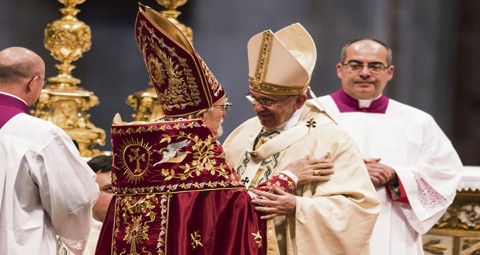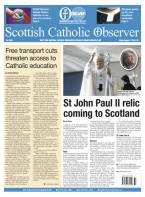April 17 | ![]() 0 COMMENTS
0 COMMENTS ![]() print
print

Pope marks centenary of the Armenian massacre
Pontiff’s use of the word s a ‘genocide’ has prompted the Turkish government to recall its ambassador to the Vatican
Pope Francis’ reference to the mass killing of Armenians by the Ottoman Turks in 1915 as a ‘genocide’ has prompted the Turkish government to recall its ambassador to the Vatican.
“In the past century our human family has lived through three massive and unprecedented tragedies,” the Pope said to mark the 100th anniversary of the killing of more than one million people. “The first, which is widely considered ‘the first genocide of the 20th century,’ struck your own Armenian people, the first Christian nation.”
His comments took place before celebrating Mass on Divine Mercy Sunday, the feast instituted by St John Paul II and celebrated on the Second Sunday of the Church’s Liturgical Easter season. The Holy Father offered the Mass for faithful of the Armenian rite in commemoration of the centenary of the ‘Metz Yeghern,’ or Armenian ‘martyrdom.’ April 24 is recognised in Armenia as the official date of the start of the event. Many Faithful and members of the Armenian rite were present for Sunday’s Mass, including Armenian president Serz Azati Sargsyan, Supreme Patriarch and Catholicos of all Armenians Karekin II, Catholicos Aram I and Patriarch Nerses Bedros XIX.
The Pope has kept strong ties with the Armenian community since his time as Archbishop of Buenos Aires, and a group of Argentinian Armenians were among those gathered for the Mass.
During the Mass, Francis also proclaimed Armenian-rite St Gregory of Narek a Doctor of the Church, making the 10th century priest, monk, mystic, and poet the first Armenian to receive the title. Widely referred to as a genocide, the mass killings took place in 1915-1916 when the Ottoman Empire systematically exterminated its minority Armenian population who called Turkey their homeland, most of whom were Christians. Roughly 1.5 million Armenians lost their lives.
Turkey has repeatedly denied that the slaughter was a genocide, saying that the number of deaths was much smaller, and came as a result of conflict surrounding World War I. The country holds that many ethnic Turks also lost their lives in the event. However, most non-Turkish scholars refer to the episode as a genocide. Argentina, Belgium, Canada, France, Italy, Russia and Uruguay are among the 22 nations that formally recognise the massacre as a genocide.
After the Pope’s comments, Turkey immediately summoned the Vatican’s ambassador to Ankara for an explanation, and then later recalled its ambassador from Rome. The foreign ministry said it felt ‘great disappointment and sadness’ at the Pope’s remarks, which it said would cause a ‘problem of trust’ between them. Turkey’s Foreign Minister Mevlut Cavusoglu tweeted: “The Pope’s statement, which is far from the legal and historical reality, cannot be accepted… Religious authorities are not the places to incite resentment and hatred with baseless allegations.”
In his greeting ahead of Sunday’s Mass, Pope Francis noted how ‘bishops and priests, religious, women and men, the elderly and even defenceless children and the infirm were murdered’ in the 1915 massacre, which targeted Catholic and Orthodox Syrians, Assyrians, Chaldeans and Greeks.
The Pope also called to mind other tragic events of the 20th century, including the violence perpetrated by Nazism and Stalinism, as well as other mass killings carried out in Cambodia, Rwanda, Burundi and Bosnia.
“It seems that humanity is incapable of putting a halt to the shedding of innocent blood (and) has refused to learn from its mistakes caused by the law of terror,” he said, noting that the enthusiasm to end such violence that came at the end of the Second World War seems to be ‘disappearing.’
In a message given to the Armenian community after the celebration, the Pope said that to remember the event is the responsibility of the whole world, so that it can serve as a warning not to repeat similar ‘horrors’ in the future. He expressed his hope that Turkey and Armenia would work toward a greater reconciliation, and prayed that the Mass and proclamation of St Gregory as a Doctor of the Church would be an occasion for all Christians to unite in prayer.
At the close of the Mass, Catholicos Karekin II spoke in English, saying that the Armenian genocide is ‘an unforgettable and undeniable fact of history.’
The genocide is deeply engrained into the consciousness of the Armenian people, the patriarch said, therefore ‘any attempt to erase it from history and from our common memory is doomed to fail.’ In the years after the genocide the Armenian Church has never forgotten ‘the continuous concern, assistance and solidarity of the Church of Rome toward Armenians,’ he said.
The patriarch then expressed his ‘deep gratitude’ to Pope Francis, praying that he would be strengthened in body and spirit so as to continue his ministry ‘with renewed dynamism and spiritual courage.’











